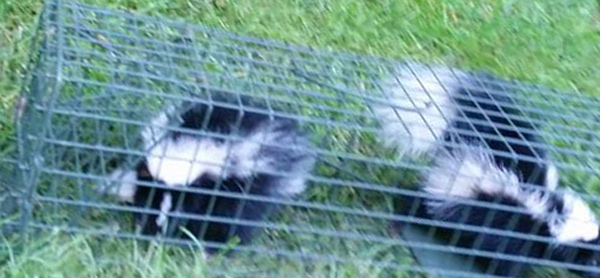- info@wildlife-removal.com
Call us for help in your town
Wildlife Removal Education
Is It Legal To Trap A Skunk?
Need skunk removal in your hometown? We service over 500 USA locations! Click here to hire us in your town and check prices - updated for year 2020.
Besides excluding unwanted skunks from your property by closing or sealing all possible entry points into spaces under buildings and your other structures, trapping is the next best thing. If a skunk has already gained entrance and made itself a den in your yard, then the needed solution may involve trapping.

Live skunk trapping is one of the most effective ways to control skunk and aside from the challenge of avoiding being sprayed, homeowners are generally not sure of what is permitted and what is not.
While skunk trapping is allowed in most states, what you do with the trapped animal is often regulated by the authorities. Their propensity to incubate and spread the rabies virus and to scatter garbage has led to state-specific laws in most states and counties.
Important to note that some species of skunk are protected by law and killing them is illegal. Depending on the city, county, state or federal regulations, a trapped skunk will either be relocated or euthanized.
In Pennsylvania for instance, striped skunks are considered to be furbearers and so are legally protected. You would need to be a licensed trapper to trap skunks, unless the said skunk is causing damage to your property. In this case, you may trap or remove it without a hunting license.
The state of Virginia declares a continuous open season on the striped skunk, meaning that it may be controlled at any time. However, there are restrictions on the trapping of spotted skunks because of their fur-bearing status. These restrictions are flexible as well, when destruction of properties is involved.
Trapped skunks in Virginia may not be transported to other locations apart from where they were captured. They may be euthanized instead, but only after non-lethal options have been exhausted.
California as well, prohibits the relocation of skunks; trapped skunks must be released on site, euthanized, or shot (where it is appropriate).
Traps may not be set within 150 yards of a property except with the express permission of the owner. Thus, it is illegal to trap skunks on your neighbor’s property.
The kinds of trap in use are also often regulated, with lethal traps being prohibited in most locations. These include large conibear traps, steel-jawed leghold traps, and body grip traps.
As seen, the legal requirements of skunk trapping varies from location to location and you should not take chances, but rather be armed with accurate information before embarking on a skunk trapping jaunt.
Go back to the Skunk Removal page.


















